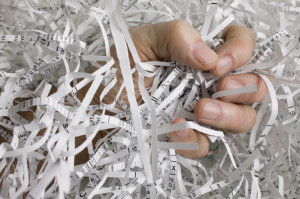Dear Liz: My mother-in-law died 11 years ago and had money everywhere. Thus, I have five drawers full of paperwork. With the exception of the IRS documents, I would love to throw everything out (shredded, of course). How long do I need the paperwork?
Answer: Two of the biggest risks to a settled estate are an IRS audit and challenges from unhappy heirs or creditors.
State laws limiting such challenges differ quite a bit, so you might want to talk to the attorney who helped you handle the estate to make sure you’re out of the woods. If there’s any doubt, you can always scan documents before you shred them so that you have an electronic record.
If it has been more than seven years since the estate and final income tax returns were filed, an audit is highly unlikely. It’s not a bad idea to hang onto tax returns indefinitely, though. Again, supporting documentation can be shredded, although you may want to scan a copy first if you’re nervous about discarding anything.
All this assumes that the estate was properly settled — that your mother-in-law’s property was inventoried, creditors paid and distributions made according to her will if there was one or state law if there wasn’t. If the proper steps weren’t taken to legally close the estate, you’ll want to talk to an attorney immediately about how to set things right.
 Today’s top story: How $250 can keep families off welfare. Also in the news:A new tool to manage your student loans, what Prince can teach you about personal finance, and how to declutter after tax season.
Today’s top story: How $250 can keep families off welfare. Also in the news:A new tool to manage your student loans, what Prince can teach you about personal finance, and how to declutter after tax season.


